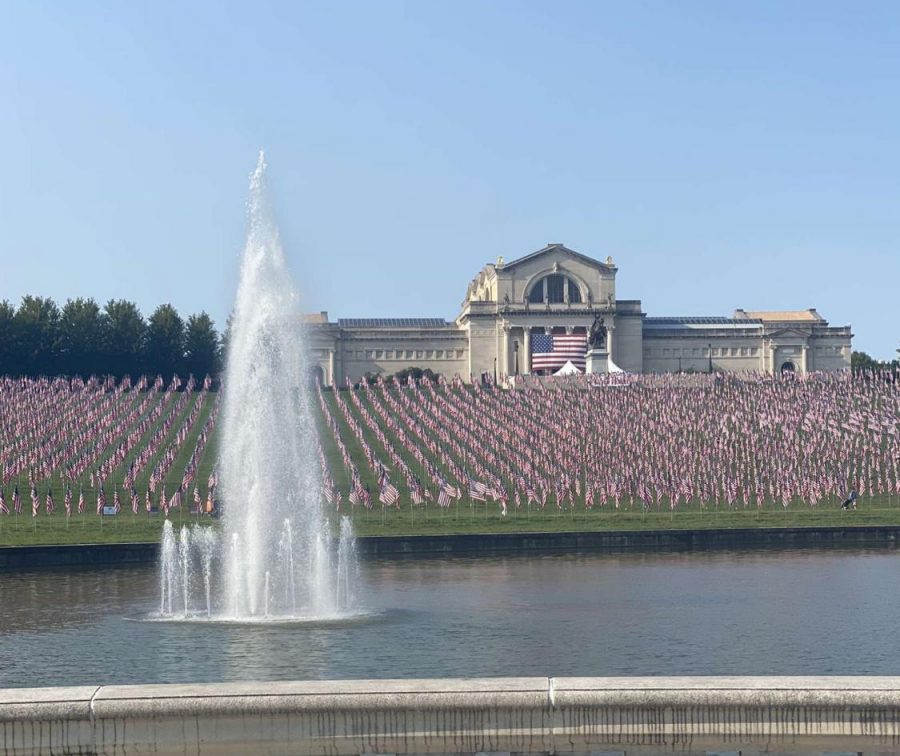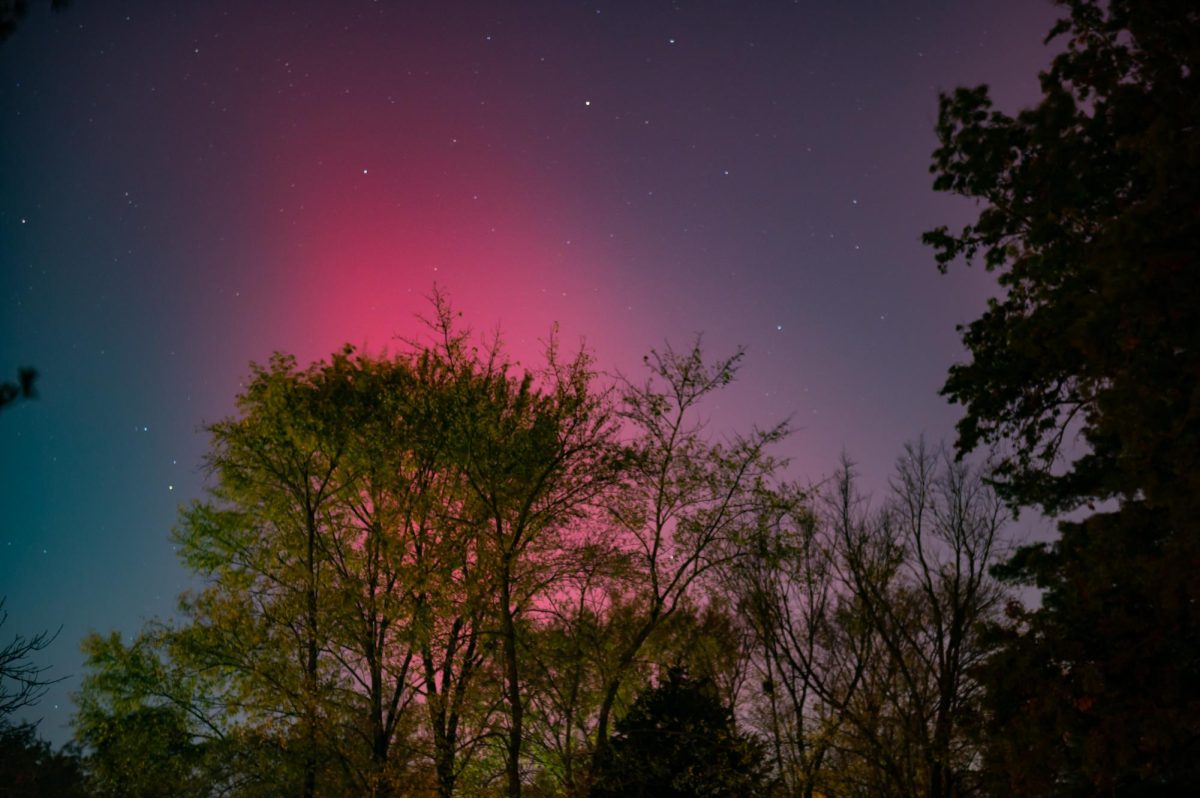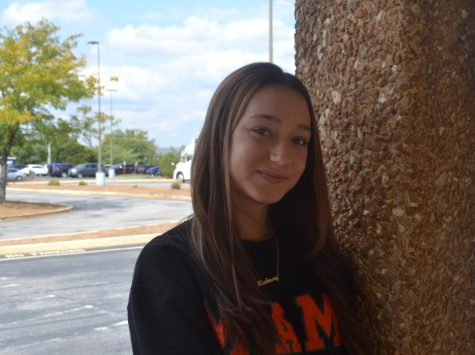This past Saturday marked 20 years since our country experienced the deaths of 2,996 individuals. Students and staff took the weekend to reflect on the momentous events of Sept. 11, 2001. While each Academic Lab spent 40 minutes discussing the tragic event, teachers within the building shared the impact of the day with their classes. English teacher Diana Lurkin’s husband, Tim Lurkins, is a member of the Missouri Task Force One (MOTF1). The MOTF1 is an urban search and rescue team that is often deployed to disaster sites, natural or manmade, to find and rescue survivors.
“Though my husband wasn’t part of MOTF1 back then, he was only 19 at the time, I can somewhat understand how hard it must have been for those first responders to run up the stairs in the face of danger when everyone else is running down to get out. It must have been for the families of those first responders to know that their loved ones were in danger. I often think about the fact that if there were another attack on our country like that of Sept. 11, 2001, Tim would likely be one of those first responders deployed to Ground Zero, and though I would be so proud to have him help in the face of a tragedy like that, it is still terrifying.”
Lurkins and her husband commemorate the tragedy of Sept. 11 by hanging a special version of the American flag on their basement wall.
“The flag has the names of the first responders who perished in the attacks on 9/11 printed on it. It’s right at the bottom of our stairs, so we pass by it everyday. It is a very poignant reminder of the bravery and sacrifice those first responders made that day as they ran towards the danger to help as most other people were running away,” Lurkins said.Â
Like Lurkins, Technology and Engineering teacher Chris Donaldson witnesses his brother, a Naval officer, relive the aftermath of Sept. 11 each year.
“[My brother] went back for the cleanup efforts soon after the attack, while ash still hung in the air and debris and soot were everywhere. He doesn’t talk about it much, but I know through his stories that even backyard gatherings with a firepit are hard for him because the memories are so connected to smells associated with fire. Something as small as S’mores will never be the same for him,” Donaldson said. “On the days leading up to 9/11 each year, he doesn’t sleep well, and we do our best to be available and keep his days full to help keep his mind clearer. I’m humbled by his and others’ sacrifice, and I’m grateful for their service locally and abroad.”
Donaldson felt like the twin towers were pillars, unshakable icons—in business, culturally and globally.Â
[After the north tower hit, my coworkers and I] didn’t leave the office for a while, and we watched different news feeds together. As we watched, I prayed silently for those in the building, nearby, their families, and for their safety,” Donaldson said. “After the South tower was hit and speculation grew on the news of it being a terrorist attack, concern grew into uncertainty and anxiousness, and I began to feel unsafe in St. Louis.”
These remaining fears from the Sept. 11 attacks were falsely tied to the Islamic faith as the Islamic extremist group, al-Qaeda, coordinated the attacks.Â
“While the terrorists may have professed Islamic beliefs, their actions were not rooted in the faith or supported by the billions of Muslims around the world,” Donaldson said.Â
History teacher Jim Hermann, aims to educate students on these myths as his wife witnessed the events of Sept. 11 from her office building in New York City, N.Y.Â
“I’ve become more determined to teach people what Islam actually teaches, and it certainly isn’t terrorism,” Hermann said. “The anti-Islamic backlash that occurred after 9/11 was disturbing to me because I know what true Muslims believe, and none of them believe that taking the life of another human through acts of terror is justified.”
From the teacher stories shared throughout Academic Lab, the goal was to remind students of the past while reminding Americans we can do better.Â
“That day was tragic, but we leaned on each other as Americans regardless of political party, socioeconomic status, etc. Those things didn’t matter immediately following 9/11, all that mattered was that we were American, we were all hurting and we all needed each other. So we gathered in the streets for candle light vigils, volunteered at relief events, organized school fundraisers to raise donations, and mostly just looked past our differences to come together and be kind, supportive, and empathetic towards one another,” Lurkins said.Â
Kroner also believes the tragedies of Sept. 11 promoted unity not only for those alive for the events, but students.Â
“The presentation we all watched [on Sept. 11] was very moving. We all came together as one to converse about our feelings on the tragedies,” Kroner said. “It really showed how an event like this affects our whole country and continues to even 20 years after the fact.”



![Gazing up from the stage, junior Joseph McCurdy who played Peter Pan in the school play, Lost Girl, sits next to senior Juliana Rogers, who plays Wendy Darling, during a theater rehearsal. McCurdy’s passion for theater began when he observed a West High production in middle school. “I've been in the high school theater program since I was a freshman. I've always loved theater, but [what prompted me to join] was [when] I went to see [a performance here] when I was in middle school, and it was super cool,” McCurdy said.](https://pwestpathfinder.com/wp-content/uploads/2025/11/IMG_6535-1200x798.jpeg)

![Standing tall, stacked in a precise formation, the cheer team strikes a signature pose during halftime on Sept. 12 at the varsity football game. Nearly a month after this performance, the cheer team performed at the Missouri Cheerleading Coaches Association (MCCA) regional competition on Oct. 4, 2025. “We've all come [to] work together a lot more,” sophomore Elyssa Philippi said. “We're a lot closer than we were [earlier in the season] and going to state has made us closer [in] trying to work with each other, learn [new] skills and make our team better.”](https://pwestpathfinder.com/wp-content/uploads/2025/11/DSC5139-1.jpg)
![Handing out candy to excited trunk-or-treaters, President of the United Nations Children’s Fund club and junior Sara Ashok represents that group. Ashok was eager to participate in this event for multiple reasons. “I really wanted to be a part of the event because I get to help create memories for kids and spend time with my friends, spreading the things [I'm passionate about],” Ashok said.](https://pwestpathfinder.com/wp-content/uploads/2025/11/DSC_8648-1-1200x800.jpg)

![Smiling in a sea of Longhorns, Fox 2 reporter Ty Hawkins joins junior Darren Young during the morning Oct. 3 pep rally. The last time West was featured in this segment was 2011. “[I hope people see this and think] if you come to [Parkway] West, you will have the time of your life because there are so many fun activities to do that make it feel like you belong here. I was surprised so many people attended, but it was a lot of fun,” Young said.](https://pwestpathfinder.com/wp-content/uploads/2025/10/Edited2-1200x798.jpg)
![West High seniors and families listen as a representative of The Scholarship Foundation of St. Louis, Teresa Steinkamp, leads a Free Application for Federal Student Aid (FAFSA) workshop. This session, held in the library, provided guidance on financial aid, scholarships and student loan options. “This event is very beneficial for any seniors who are applying to or considering applying to colleges after high school [because] the cost of college is on the rise for seniors and parents,” college and career counselor Chris Lorenz said.](https://pwestpathfinder.com/wp-content/uploads/2025/09/DSC_4478-1200x778.jpg)
![Senior Kamori Berry walks across the field during halftime at the Homecoming football game on Sept. 12. During the pep assembly earlier that day, she was pronounced Homecoming Queen. “I thought it was nice that the crowd [started] cheering right away. I know [my friends] were really excited for me, and my family was happy because typically non-white people don't win,” Berry said.](https://pwestpathfinder.com/wp-content/uploads/2025/09/DSC7046-Enhanced-NR-1200x798.jpg)


